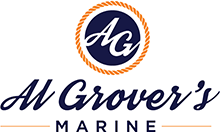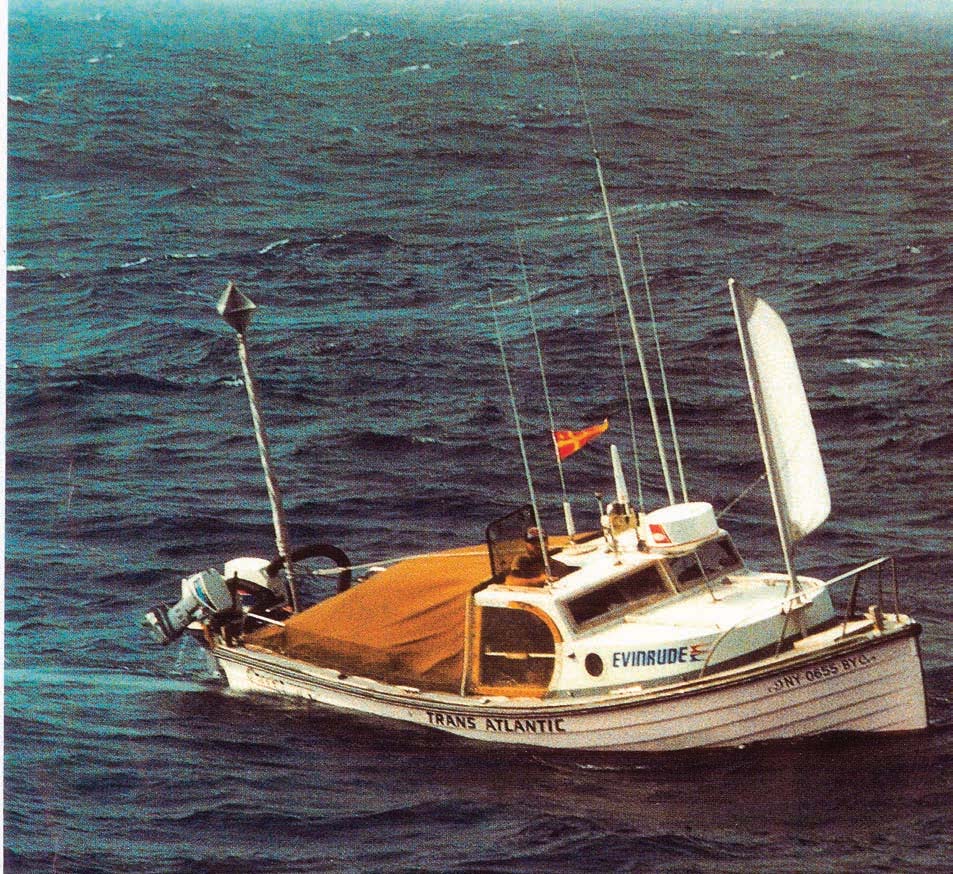Al Grover set out to accomplish something that had never been done
Crossing the Atlantic in a small outboard. There were numerous attempts, preparations and changed plans. And once the trip was finally under way in 1985, he’d endure a gale, a hurricane and even falling off the boat before reaching Lisbon and going down in the Guinness Book of World Records.
The voyage was ill-fated from the start. While the two boats were being trailered to Nova Scotia, one of the trucks jackknifed and flipped in a ravine, causing so much damage that the boat had to be left behind. The accident proved fortuitous, for they learned at sea that the boats would have never stayed together. Having the one boat also eliminated going north, since they would be better able to depend on heavier boat traffic on the southern route to the Azores to save them if they got into trouble. Father and son launched the boat at Pictou, Nova Scotia. Once in the water and loaded with 4,400 pounds of fuel, the boat had just 10 inches of freeboard. Nevertheless, they headed for their departure point – the island of St. Pierre, off Newfoundland’s south coast.
While at St. Pierre, they met a sea captain, Claude, who was making the Atlantic crossing the next day in his 55-foot ketch, and the two set a schedule to stay in touch.
As they left the next day, Aug. 1, 1985, weather conditions seemed ideal. But by nightfall the personality of the Atlantic had changed. Seemingly without warning, they found themselves in the midst of a gale. “We got our brains beat out,’’ Al Jr recalls. “The winds came with such powerful force. Waves were 10 or 12 footers. When it’s hitting you, you feel like somebody is throwing concrete against the boat.’’Thirty-six hours later, they were out of the gale.
The 12th day out, with seas rolling and Al Jr. going below to get some shut eye, Al Sr. walked to the stern unwisely, without a lifeline to put the auxiliary engine down. While trying to force it down, he flipped overboard. The boat continued on. “I heard the splash and I jumped up and saw that he had gone overboard,’’ Al Jr. recalls. “I put the boat in neutral. He had to swim back to the boat because it was drifting. He’d get 10 feet from the boat, but then a wave would come and slide him away 100 feet or so. I’d say for a good 10 or 12 minutes he was swimming as fast as he could.” He finally caught up with the boat and was pulled aboard. But they were far from being out of danger.
Throughout their trip, they had received constant reassurances from Claude, the captain they met in St. Pierre, about the weather and the Trans Atlantic’s ability to handle anything that came its way. But about the 19th day out, they could sense concern in his voice. “He indicated there was a storm coming and it wasn’t going to be okay,’’ Al Jr. says. “The tone in his voice made us realize we were in a bad position.” They were about to get hit by Hurricane Claudette. Al had a friend based at Governors Island who monitored Atlantic traffic for the Coast Guard. Al says abandoning ship and getting rescued was never an option. “I wouldn’t have abandoned that boat unless she was sinking,’’ he says. With the weather particularly bad one night waves were more than 25 feet and winds of more than 75 knots Al feared the worst. “I told Al I didn’t think we’d survive the night and we’d kind of said goodbye,’’ Al recalls. “He didn’t like that.’’ Recalls Al Jr.: “There was a period when my Pop said to me, ‘I guess we better get ready,’ meaning the boat was going to come unglued and we weren’t going to make it. He said, ‘I think we’re done.’ ’But Al Jr. told his dad he wasn’t through living. “When I was up he was down and when he was down I was up. We just supported each other and it worked.’’ Throughout most of the storm, they shut the engines down and drifted, running with the waves. A small steadying sail helped to keep the bow running down wind. Through part of the storm, they were out of radio contact because of drained voltage. During the absence of radio contact, many feared the worst. But eventually the seas grew calmer and they realized that maybe they’d survive after all. Al credits the buoyancy of the boat it floated atop the waves like a bobber on a fishingline with their success in making it through the hurricane.
With the hurricane over, Al and Al Jr. had just one minor challenge getting to the Azores. They had no detailed charts and had lost their position. Once his VHF radio and the boat’s power system recharged, Al was able to reach the captain of a 150-foot Portuguese fishing boat, who met up with them and gave them a true course to Flores.
When they reached Flores with less than 60 gallons of gas, Al Jr. immediately jumped ship, refusing to reboard the boat, After making the 1,500-mile trip from St. Pierre to Flores, Al Sr. wasn’t so sure of continuing the trip himself and making the nearly 1,000-mile run from the Azores to Portugal. “I called Arti and said, ‘I’m finished. Al’s gone and I’m dead [tired]. I can’t go on.’’ But surprisingly, instead of agreeing with his decision to end the voyage, Arti urged him to continue. “She said, ‘You have to finish,’ ‘’ Al recalls. “She realized that if I came home then I’d be a beaten man.’’ Arti dispatched their next son, Dante, to the Azores to complete the trip with Al. Claude, the sea captain, met up with Al in Flores. Al traveled onto Horta, on the island of Faial, and filled up with 600 gallons and met up with Dante. They then traveled to Ponta Delgada on San Miguel before making the run to Lisbon. As Dante boarded the boat, fortunes change. The trip from the Azores to Lisbon was totally uneventful. Water on many days was water-skiing flat. The father and son made landfall at Lisbon on the night of Sept. 3, 1985, with a small party, including the Evinrude dis- tributor for Spain and Portugal, greeting them. In all, they logged nearly 3,000 miles over 33 days, 26 of them at sea. The voyage was entirely free of mechanical problems, with two thirds of the trip being powered solely by the 9.9 kicker. Above all, the Groverbuilt Trans-Atlantic proved she could weather some of the worst the Atlantic had to offer.


